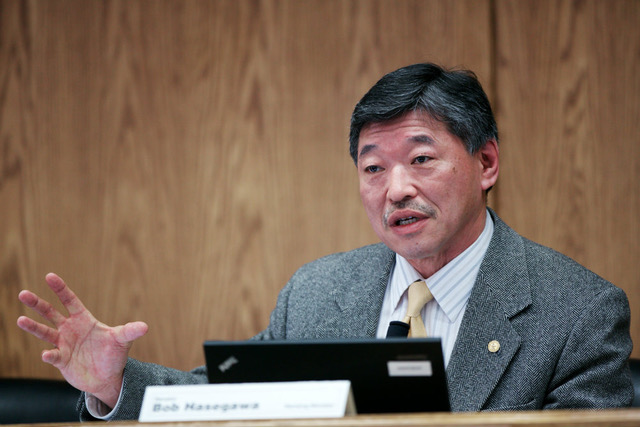The Urbanist Elections Committee invited candidates in the Seattle metropolitan region to fill out our questionnaire and participate in our endorsement process. We based our endorsement decisions on the responses and follow-up interviews.
Below is the response from Bob Hasegawa, who is running for State Senate District 11.
What lessons about government revenues and fiscal priorities from the wake of 2008 would you apply in responding to the Covid-19 crisis? (200 words or less)
Austerity is not the answer, in fact it’s an exacerbator for recession. This crisis provides an opportunity to push for broad systems changes. Primarily, addressing the disparate impact of under-funding our social safety nets in favor of austerity economics driven by the corporatization of government. Our state’s “go-to” economic development strategy is giving corporate tax breaks under the theory benefits will trickle down to the masses; a losing strategy that cuts into the state’s ability to fund things we all need. We have an opportunity now to reform our revenue structure to make it more equitable, sustainable, and reliable. Then we must get back to using state funds to build an entire ecosystem that supports people, which is our greatest economic development weapon, and is enticing for innovative businesses to locate and thrive here. That means investing is a world-class education system starting from early childhood, best educated and prepared workforce, most creative thinkers, best healthcare system that covers everyone, best housing for all, new strategic economic development initiatives including urban planning and growth management system reforms, with a world class transportation system to support it. Currently, we can’t even maintain the ecosystem and infrastructure we have, let alone develop it for future needs and generations because we have no way to finance it. A publicly owned state bank is a cornerstone for that change because it opens so many opportunities for us to pursue by dramatically increasing our public financing capacity, and keeping our tax dollars in Washington and leveraging them to benefit our entire state, rather than generate profits for Wall Street.
Would you vote for a bill that ends the ban on rent control in Washington? Why or Why not? (50 words or less)
Yes. But, voting to end a ban on rent control and then having to pass rent control is a simplistic solution that doesn’t cure the underlying problem, which is there is inadequate supply of housing to offset demand. The solution is to build massive amounts of PUBLIC housing. But not in the old sense of “the projects.” Rather, we can build public housing communities that are diverse in every sense–racially, mixed income, multi-generational, mixed use facilities with storefronts, small businesses, maybe even light manufacturing, community school classrooms, retail, community hubs, social services, green spaces, mixed ownership of units (while the public retains ownership of the land), etc. Of course it all gets back to financing capacity, which is where the public bank comes in. We’ve been lulled into a sense that developers will solve our housing shortage and homelessness crisis. They will not, because it’s not in their best interest to do so. They want profits and high values relative to investment costs come from a shortage of supply. We need to get back to a public housing paradigm as the solution. Only the public can build sufficient housing supply to keep costs “affordable,” however one defines that.
What role do you see the state playing in enacting land use reform, and what should that reform prioritize? (200 words or less)
#1-STOP selling off public land to developers. We need to build huge amounts of public housing, and we need the land to build it on. For example, we cannot condone selling off acres of Yesler Terrace to developers, which is some of the most valuable land in Seattle. I believe land use reform is key to addressing inadequate housing supply near jobs, which stems from the greed and profits of developers who have successfully changed the housing paradigm from public housing to “affordable” housing (as described above).
The answer to this question is interrelated to my answer to the second question below. Briefly, we should look at our overall strategic master plan for economic development and growth management.
What should be the major components of a climate package? (50 words or less)
We need a social justice focused EverGreen New Deal.
What should be the top strategies for the state to fix the cycle of segregation, disinvestment, gentrification, and unaffordable housing in our cities? (200 words or less)
Our growth management strategy hasn’t worked because it has created centers of extremely high density and wealth in economic magnet areas which has negative ripple effects of gentrification and displacement throughout the region. The ripple effect is magnified for poor people and people of color. With growing income inequality, wealthy workers live in close proximity to their jobs while others are forced to move to more “affordable” places and commute. All workers are finding it increasingly difficult to live near their jobs. We could solve homelessness, keep housing costs down, create thousands of jobs, eliminate gentrification, and resolve a big part of our transportation problem by building sufficient amounts of public housing as I envisioned above, which is close proximity to people’s jobs.
We also need to distribute economic development opportunities in other areas around the state to take the pressure off the core central Puget Sound area, especially South Lake Union. The rest of the state is clamoring for economic development opportunities. These types of strategically designed and located economic development zones when connected by a world class transportation infrastructure (like high speed rail) can spread prosperity around the state to places like Moses Lake, Spokane, Tri-Cities, Vancouver and southwest Washington, Bellingham, etc. and take the growth pressure off of South Lake Union and central Puget Sound areas.
Of course it gets back to financing capacity, which is why we need a public bank.
What’s your roadmap to fixing educational inequities in Washington state? How can Washington state comply with its constitutional duties regarding education? (200 words or less)
I’ve been a long time fighter for strong, equitable public education in the Legislature. Last session, I passed 3 bills education equity bills through the Senate: SB 6066 requires OSPI to provide ethnic studies materials for all grades, including K-6, SB 6138 provides support and mentorship to beginning educators of underrepresented communities, and SB 6047 works to ensure educators can advocate for their students, and that all students will receive the support they need. That said however, this is a broad systems level problem that cannot be solved by itself. Look at the work of the Educational Opportunity Gap Oversight and Accountability Committee for their work and recommendations. It’s not just about grades and classrooms, but also the entire ecosystem that supports education–addressing issues like homelessness, hunger, poverty, and income inequality generally, et al. As a lifelong economic and social justice organizer and one of only seven people of color in the Senate, I try to keep an eye on an expansive portfolio for disparate impacts. I have a responsibility to all people of color and underrepresented communities in our political system to amplify their voices, and help the Legislature see through a racial equity and social justice lens on all legislation.
Do you think Washington state should have an income tax? If yes, what is the legislative path? If not, would you pursue any tax reform? (100 words or less)
Yes. Our current coronavirus crisis is actually a once in a lifetime opportunity for systems change with revenue reform at the top of the list. Yes, I support a progressive net income tax. I do not support a flat or gross income tax. We need the ability to force wealthy employers and individuals to pay their fair share to support the society that created their wealth for them. Most small businesses I’ve talked with will quickly tell you they’d prefer a net income tax over the current gross income tax system because with a net income tax, you don’t pay tax unless you’re actually making money, whereas with the gross income tax you pay on every transaction whether or not you actually make any money. Comprehensive progressive tax reform will help all small businesses grow and thrive, and their jobs along with them. A state bank is an integral part of revenue reform because it will not only raise revenue without raising taxes, but it’s also about how we put progressive revenue to work for the people.
While California and Oregon have passed a clean fuels standard aiming to meet their climate goals, Washington did not, as the bill stalled out last session. Would you vote for it? If not, what is the route to meeting our climate goals? (150 words or less)
The key will be in the execution of that platform to ensure equitable outcomes and impacts, and live up to the environmental justice goals of the platform without placing disparate burdens on people of color, poor people and working families. The bill you refer to last year was flawed, allowing the Dept. of Ecology to make all the rules with the authority to automatically implement them. Lobbyists would then have the most influence without democratic accountability to the people. It is the democratically elected and accountable members of the Legislature’s responsibility to make the law, and the agency’s responsibility to make the rules to implement the law. We cannot allow unaccountable agencies to make the law and the Legislature should not abdicate that responsibility to an agency. Clean fuel standards will undoubtedly most negatively impact those I referenced above who’ve been displaced and gentrified from proximity to their jobs, and have to travel the farthest because of that, especially without adequate public transportation. The route to meeting our climate goals whatever it is, must have equity, and everyone in it to fix it. An EverGreen New Deal that plans for the just transition is key, and a public bank to finance it is another.
What percentage of the state’s transportation budget should be for alternatives to cars, such as transit, biking, and pedestrian infrastructure? (100 words)
This problem is best addressed by not needing so much commuter transportation to begin with, i.e. creating sufficient housing supply near where the jobs are. Low wage workers who’ve been displaced or gentrified are unlikely to walk or bike from Auburn to Seattle, or even Tukwila or Renton for that matter. We do however need walkable communities. Transit service needs serious improvement to get folk to where then need to go quickly and reliably, including to their jobs, to community hubs and central business districts, and between central business districts (light rail), and between economic development hubs distributed around the state (high speed rail). This requires a rethinking of our strategic growth management and economic development plans.
What should be a higher priority: electrifying personal vehicles or reducing the number of trips made in personal vehicles? Explain how to achieve your priority. (50 words).
I don’t understand the high focus on personal vehicles, the solutions for which are always disproportionately negative against those who can least afford it. Yes, transportation is 40% of the pollution problem, but much of that is also commercial, which always gets their carve outs from the solution. Everyone must participate in the solution, including the other 60% of polluters.
The Urbanist Elections Committee’s Take: Vote Hasegawa
Read our full endorsement here

Owen Pickford
Owen is a solutions engineer for a software company. He has an amateur interest in urban policy, focusing on housing. His primary mode is a bicycle but isn't ashamed of riding down the hill and taking the bus back up. Feel free to tweet at him: @pickovven.

